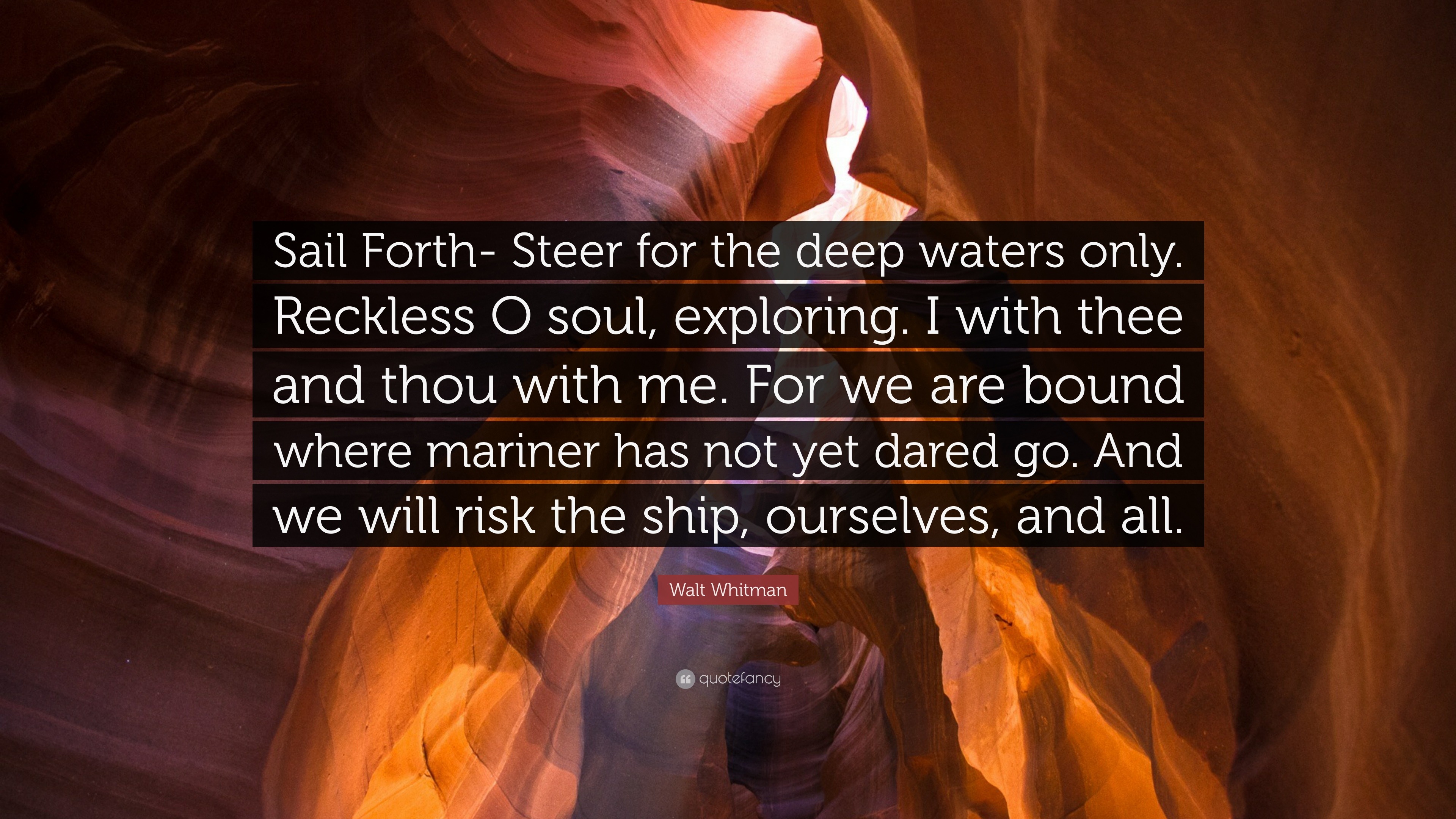

What is life then, but one grand adventure, one epic poem? To be a poet is to embrace the story of your life as it unfolds. - Sail forth steer for the deep waters only, Reckless O soul, exploring, I with thee, and thou with me, For we are bound where mariner has not yet dared to go, And we will risk the ship. And we will risk the ship, ourselves, and all.” For we are bound where mariner has not yet dared go. “Sail Forth- Steer for the deep waters only. Walt Whitman wrote the prayer for the soul of a poet. A poet goes to life without armor because he knows only when you are vulnerable to injury are you susceptible to bliss. Whatever pain he might feel, whatever innocence he may carry is guarded by his impenetrable ethos.
Sail forth steer for the deep waters only full#
The difference between a poet and a soldier, is that the soldier’s heart is full of scars armored in Spartan red. A poet is a tuning fork that resounds the human experience, and Fortune herself, the striker. A poet can express unimaginable heartbreak, but he never complains. A wooden pole should be three inches or more in diameter for a small sail and six inches for larger sails. The owner’s requirements will determine the height. For as Soren Kierkegaard says, “A poet is not an apostle he drives out devils only by the power of the devil.”Ī poet can express unimaginable joy, but he never brags. A metal post or pole used for a shade sail should have a diameter of at least three inches and a gauge of 12 or better for rigidity and strength. And if that which fuels his fire is fire itself, he cares not. steer for the deep waters only, Reckless, O soul, exploring, I with thee, and thou with me, 120 For we are bound where mariner has not yet dared. He despises those ameliorates that dull his senses, and heralds that which fuels his fire. When a poet feels these things he throws himself into a passion, a challenge, a fight, a dance, anything to make him feel. To be a poet is to have one true enemy with many names. For she knows that her only salvation is on the other side of that hole, where there are no demons left unmasked, and no poisonous tears unspilled. If on this path a poet suffers a tragedy, she does not claw in panic from the depths of despair. A chance that their entire life can be an epic poem that echoes in the halls of eternity. Stephen Dunn says, “All good poems are victories over something.” The poet trades 1000 days of idle leisure for any adventure. You scrub them until they are so raw that your familiar lover smells of lust and danger, a cup of coffee is like a warm hug from an old friend, and morning sunshine still tickles with the light of unmanifested dreams. We dare to seek, but that venture is joyful because no matter where we journey we travel on “all the seas of God.” Because God is the inspiration, the means, the context and the destination of all our seeking, we know we can venture forth without fear.To be a poet is to wake up every morning and file the callouses from your senses. Our seeking has no predetermined endpoint we engage it for the sake of the trip rather than the expectation of one specific destination.įinally, even in the midst of all these other realities, Whitman reminds us that we are safe. And fourth, the poet confirms for us that the journey is long. In order to embark, the protective barriers around our hearts must fall away. Third, because of this reality, we should accept that our seeking will demand courage. Embracing the unknown necessarily includes risk. Second, our adventuring must assume the exploration of new territory when we leave our port, we will not always feel comfortable or secure. Every sail must be shaken out as we strive toward the deep waters. First, we must commit–and not commit with half measures. This passage assumes a number of aspects of venturing out in whatever form that takes. Whitman himself was non-committal when it came to claiming any one faith tradition in today’s parlance he would probably identify as “spiritual not religious.” Still, some of his work contains the clearest and most passionate descriptions of the soul’s restless desire for discovery ever written. O my brave soul, O farther, farther sail O daring joy, but safe Are they not all the seas of God O farther. has not yet dared to go, And we will risk the ship, ourselves and all. Walt Whitman wrote the words above, and while they describe an actual, physical journey, they also encourage the seeking that is essential to a living faith. Sail forth-steer for the deep waters only, Reckless, O soul, exploring, I with thee and thou with me, For we are bound where mariner. O daring joy, but safe! Are they not all the seas of God? Reckless O Soul, exploring, I with thee and thou with me,įor we are bound where mariner has not yet dared to go,Īnd we will risk the ship, ourselves and all. Sail forth-steer for the deep waters only Cut the hawsers-haul out-shake out every sail!


 0 kommentar(er)
0 kommentar(er)
